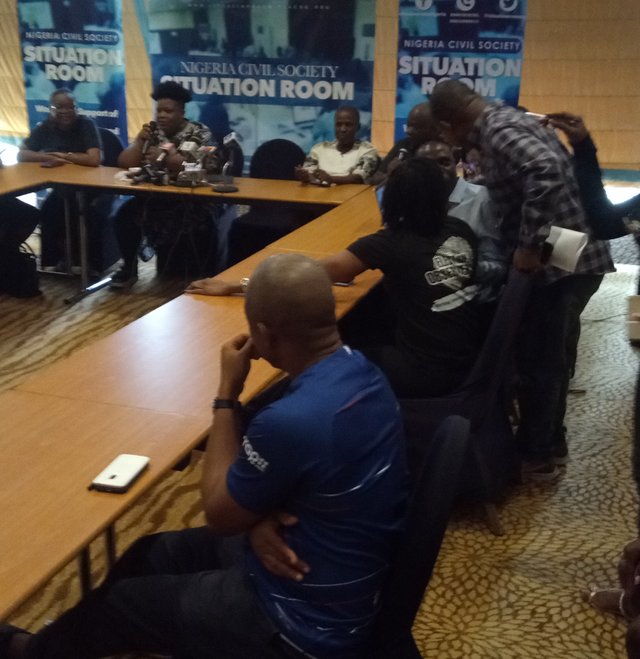
In the posh Transcorp Hilton in the heart of Abuja, Nigeria’s capital city is located the Civil Society Situation Room on the series of elections that were to have started earlier today, February 16th, 2019 with the election of a new president and members of the National Assembly. Situation Room tradition became part of civil society disciplinary package on electoral rascality that historically characterized elections in Nigeria in terms of observing the rules of the game. Made up of veterans of the early post Cold War NGOs in Nigeria, their legatees and organic academics, the now postponed election would have been the peak of its capacity for critical distance, vigilance and sophistication in delivering outcomes that stakeholders can use even as largely consensual and even neoliberal as the civil society in Nigeria.
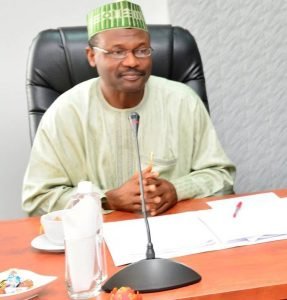
INEC Chairman, Prof Yakubu Mahmood: Is postponement an innocent thing or there is something more than meets the eyes?
That was not to be because, by 10. 00 a.m when Intervention strayed into the Situation Room, the minders were suffering from a dosage of INEC-quine which Prof Yakubu Mahmood, the Chairman of the Independent National Electoral Commission, (INEC) had administered on Nigeria about seven hours earlier: the election scheduled to start by 8. 00 am on February 16th, 2019 could, for logistics reasons, no longer go ahead. It was Prof. Yakubu’s press conference by 2.30 am or so on the day.
That is not the first time that would happen since 1999 when civilian rule was restored. It has happened twice before. But each time it happened previously, a clear reason was given. In 2011, INEC said certain materials printed outside the country had not arrived in the country. In 2015, the story was the need to deal with Boko Haram and to guarantee better distribution of PVC. This time, a conceptual black box called logistics was the reason pleaded. How far such a reason would be read any less than a tactical manoeuver by the incumbent to outflank the opposition is anybody’s guess.
The suspicion is enhanced by developments that are now being brought in as preparing the ground for a sinister script. One of such development is the reported arrest of some men in Kano three days earlier with sacks of ballot papers. While some people say it was fake ballot papers, others say it is specimen. Whatever it was, such a story could go a long way in confirming suspicion that some people are bound to rig the elections. Kano being an APC stronghold would make all fingers to point to the party for the (fake) ballot papers. The second would be the narrative of 66 persons that Governor Nasiru el-Rufai suddenly came up with a few hours to the election. Knowing the ethno-religious sentiments that news of any such killings, including children and women, could generate nationwide, the question is why did the governor make such claim at the time he was making it when, in truth, there was no such fresh killings? There was killing but it did not take place the time the governor claimed. Some people were killed in the site but precisely a week earlier and certainly not even half of that number, although not even one person ought to die unlawfully. So, who could be fooling who, it was asked.
The third example would be the fire outbreak in no less than three state offices of INEC. Even Prof Yakubu cited this at his meeting with stakeholders at the International Conference Centre subsequently. How could such high security sites catch fire a few days to the actual dance? Of course, President Buhari’s interview credited to CNN about being unbeatable formed part of the list. While such a statement might irk no one if made by a president commonly adjudged to be a stellar-performer, this is not the case here where the president’s claims of achievement are what the election is basically to resolve. His statement could thus be complicating the situation with such boast. The question now is what might have actually happened? Was INEC overwhelmed by the sheer weight of the task? Was it Act 1, Scene 1 of a rigging script? Or was it just incompetence? Why was INEC confidently assuring the nation at every turn? Was it pre-emptive cover up what it knew to be in the offing, making denials to be a confirmation?
Snippets that even the INEC boss did not challenge suggest that, up to midnight Friday, very few states were actually ready. In one state in the Northwest, the story began since 3. 00 am on Thursday night of an aircraft bringing materials from Lagos through Sokoto. Till the announcement of the postponement, no such plane arrived. In the case of a core state in the Northeast, the struggle for election materials were still on by midnight on Friday. It was clear that by no magic could anything called elections take place later in the day. In yet another state, not many of the card readers had been activated by Friday afternoon. And in some others, they were told the ballot papers for National Assembly were not available. Were these instances those of INEC just not ready or INEC having something in mind?
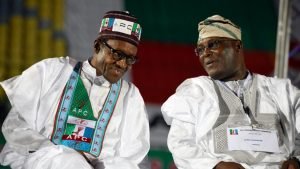
Who wins determines the truth of the postponement
The relativity of truth is such that Nigerians will continue to contend with various narratives of the postponement for quite sometimes. Only power would determine the truth. That is the power that will unfold on February 23rd, 2019. If Buhari wins, it means all claims linking the postponement to a rigging script will end up as a tale told by people who have nothing to do. If Atiku Abubakar of the opposition PDP wins, it would instantly become a proof of the postponement as a rigging script. Whichever way it goes, things cannot be looking more and more nightmarish for the incumbent. It is not true that the postponement would substantially reduce the number of voters. Parties determined to run the race fully would still get their actual voters to vote. But, certainly, the government would lose the empathy of many who cannot go back ‘home’ on February 23rd, 2019 to vote, leaving INEC boss and the incumbent with so much to do if they ever hope to regain credibility. INEC has become so suspected.
Not when the key civil society leaders, not to talk of leading politicians, are one in shock with the postponement, with some such as Civil Society Legislative Advocacy Centre (CISLAC) calling for an investigation. The Nigeria Civil Society Situation Room said the postponement casts a cloud of doubt on INEC’s credibility and competence in conducting the election”, a duty to be honest and transparent with Nigerians which the Room holds INEC to have fundamentally breached. It is concerned with unforeseen financial and logistics burden on political parties, candidates, businesses and indeed the generality of Nigerians as well as with the Commission explaining to Nigerians how they would be able to address the extra financial and logistics burden that comes with running the postponed election, the management and integrity of already distributed materials,
The Situation Room which is a collection of civil society organisations (CSOs) working in support of credible and transparent elections in Nigeria stretches from groups such as Policy and Legal Advocacy Centre (PLAC), CLEEN Foundation, Action Aid Nigeria, Centre for Democracy and Development (CDD), Proactive Gender Initiative (PGI) Enough is Enough Nigeria, WANGONET, Partners for Electoral Reform, JDPC and YIAGA Africa Others are Development Dynamics, Centre for Citizens with Disabilities (CCD) Stakeholders Democracy Network, Human Rights Monitor, Reclaim Naija, CITAD, Alliance for Credible Elections, (ACE), CISLAC and several other CSOs numbering more than seventy. It is insisting on putting Nigeria first by all stakeholders while also warning against tactics of misinformation and inciting comments capable of undermining peace and security. At the same time, it calls on security agents to remain professional and neutral as the nation confronts what it sees as a challenge.
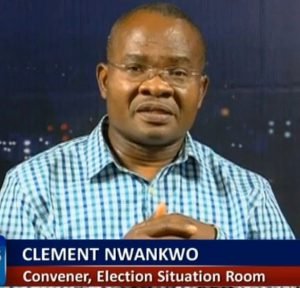
Barr Clement Nwankwo, ED, PLAC & SR Convenor
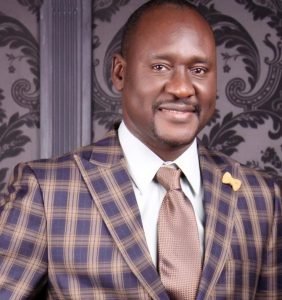
Auwal Musa aka Rafsanjani, ED, CISLAC
Following in almost the same language and issue areas, the Election Analysis Centre (EAC) of the Centre for Democracy and Development, (CDD) expressed shock and disappointment with the postponement, saying the nature of the cancellation statement by INEC left much to be desired with particular reference to friends of Nigeria, ad-hoc staff like National Youth Service Corps members, the organised private sector, entrepreneurs, schools, political parties, local and international election observers. Although it urged all Nigerians not to be deterred by the postponement and to turn out enmasse to vote on the new election dates, it is equally hoping that INEC would take advantage of the extra time provided by the postponement to rapidly and robustly address any weaknesses in project management, logistics management and public communication. “There is an urgent need to re-energise Nigerians to turn out to vote so as to avoid voter apathy, and we call on civil society and the media to assist in this process”, said EAC.
It is seeking guarantee that INEC take urgent steps to reassure Nigerians and the international community that it will indeed be ready to conduct free, fair and credible elections on the new dates of 23rd February 2019 for the Presidential and National Assembly Elections and 9th March 2019 for the Gubernatorial and House of Assembly elections. “We are particularly concerned that certain sensitive materials had already been deployed in various parts of the country and there is an urgent need to assure the public of the security of those materials ahead of the new dates”, EAC stated.
Recalling its Friday, February 15th, 2019 bulletin on Electoral Governance where it had reckoned with certain characteristic features of the conduct of elections in Nigeria in spite of the usual INEC’s bullish representation of itself in terms of readiness to conduct free, fair and credible elections, EAC was, however, hopeful that lessons from the 2011 and 2015 elections would have immunized the 2019 election against such. It listed such persistent features that defined each election as weak project management (leading to lateness in the procurement of necessary election material), weak logistics management (leading to the late arrival or, in some cases, non-arrival of sensitive election materials), poor contingency planning, inadequate voter education, and reactive (rather than proactive) public communication.

Only the Civil Society Legislative Advocacy Centre (CISLAC) departed by centralizing an investigation of what it calls abrupt postponement of the Presidential Election few hours to the elections. Assigning this to the National Assembly as a matter of urgency, CISLAC says only doing so through an ad hoc Committee to investigate the sudden postponement would clear the Commission of public doubt that her decision was not informed by desperate desires of individuals or groups who wants to assume or sustain power by all means.
Declaring its awareness of systemic conflict of interests and questionable procurement process imbibed by the various positions in the Commission, creating tendency for mutual sabotage among the three (3) levels of appointees—National Commissioners, Resident Electoral Commissioners, (RECs) and appointed Directors in various Departments, it deplored the wastages and costs of the action to various participants, particularly large number of youth corpers deployed.
Like the Civil Society Situation Room and EAC, it is also dead worried about the safety and integrity of elections materials which have already been distributed across the country, demanding assurances of their safety from unauthorized elements between now and the new date of February 23rd, 2019. CISLAC doesn’t want civil society groups, media, national and international observation missions to lessen their surveillance on the electoral process towards promoting free, fair and credible elections that will be acceptable to all.
The 2019 elections is rated the largest in Nigeria’s history and the largest in the African continent.
Posted from my blog with SteemPress : https://intervention.ng/15028/